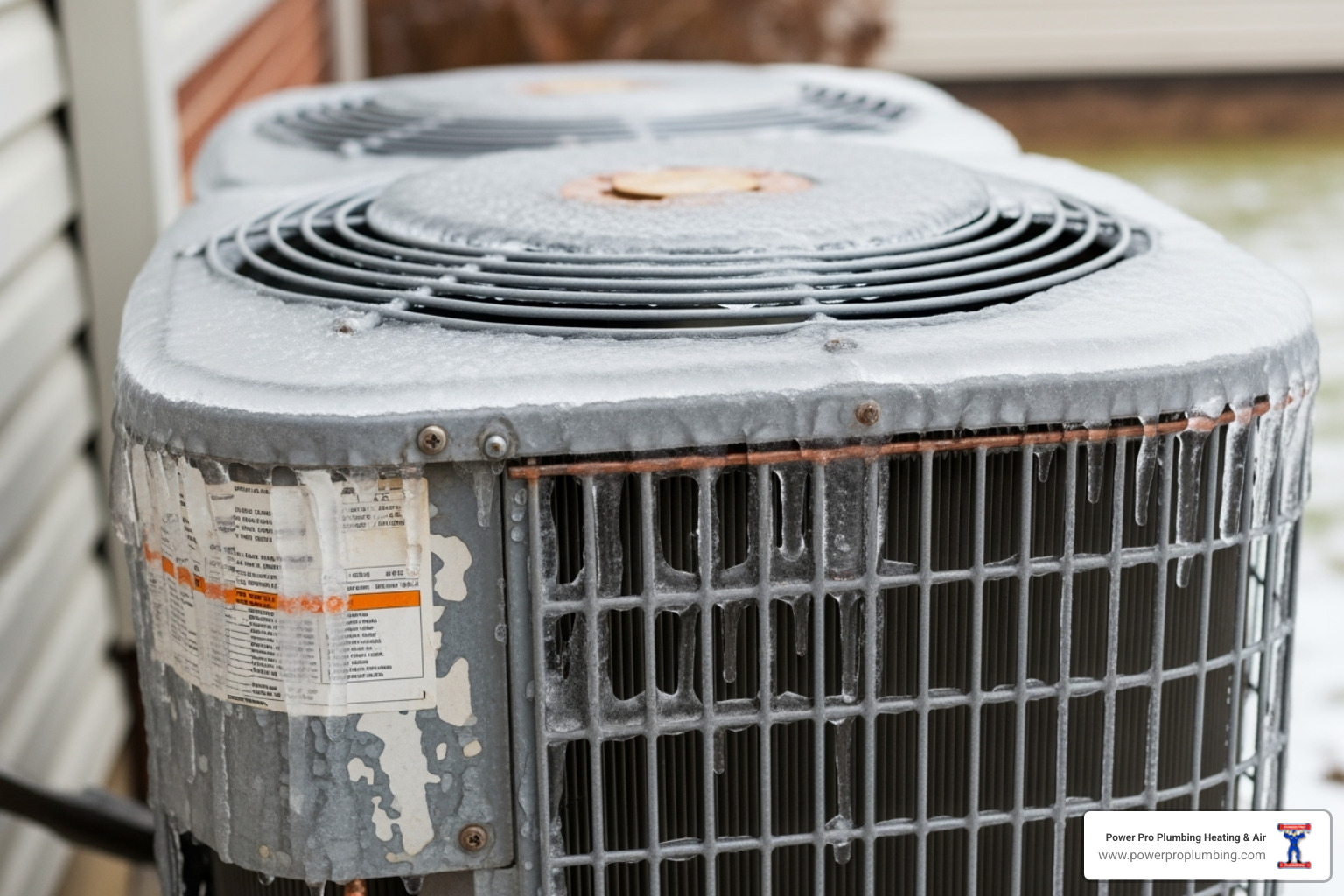
Understanding Why Your AC System is Freezing Up
An AC system freezing up is a frustrating problem, especially during a hot Southern California summer. Instead of cool relief, you find ice covering your air conditioning unit.
Quick Answer - Signs Your AC is Frozen:
- Visible ice on the unit or refrigerant lines
- No cool air coming from vents
- Water puddles near the indoor unit
- Reduced airflow or warm air from registers
- System runs constantly but the house stays warm
This common issue can often be prevented with proper maintenance, and many causes can be safely resolved by homeowners. A frozen AC occurs when the evaporator coil gets too cold, causing moisture in the air to turn to ice. This ice blocks airflow and stops the system from cooling your home. If left untreated, it can damage expensive components like the compressor.
This guide will show you how to identify a frozen AC, what causes it, and the immediate steps to take. We'll also cover prevention strategies to keep your system running smoothly.
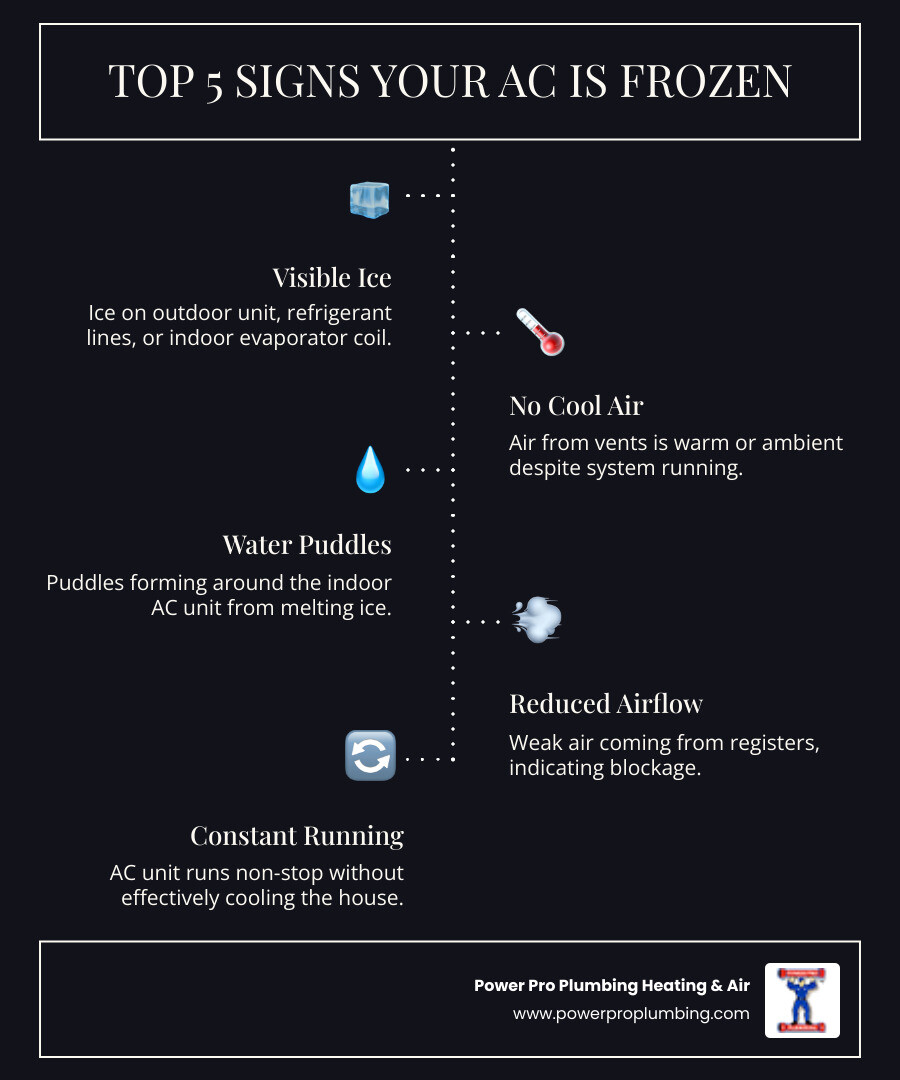
How to Tell if Your AC is Frozen
If you suspect your AC system is freezing up, there are several obvious signs. The most direct clue is visible ice formation. You might see it on the copper refrigerant lines or as a block of ice on the evaporator coil inside your air handler.
Beyond ice, you'll notice performance issues. No cool air from your vents is a common first symptom, often accompanied by warm air or significantly reduced airflow. The ice buildup blocks the evaporator coil, preventing it from absorbing heat and restricting air from passing through. This forces the unit to run constantly without cooling your home, leading to higher energy bills. In severe cases, the system may not turn on at all.
Other telltale signs include water puddles near your indoor unit as melting ice overwhelms the condensate drain, potentially causing water damage. You might also hear unusual hissing or bubbling sounds, which can indicate a refrigerant leak, or dripping noises from the melting ice.
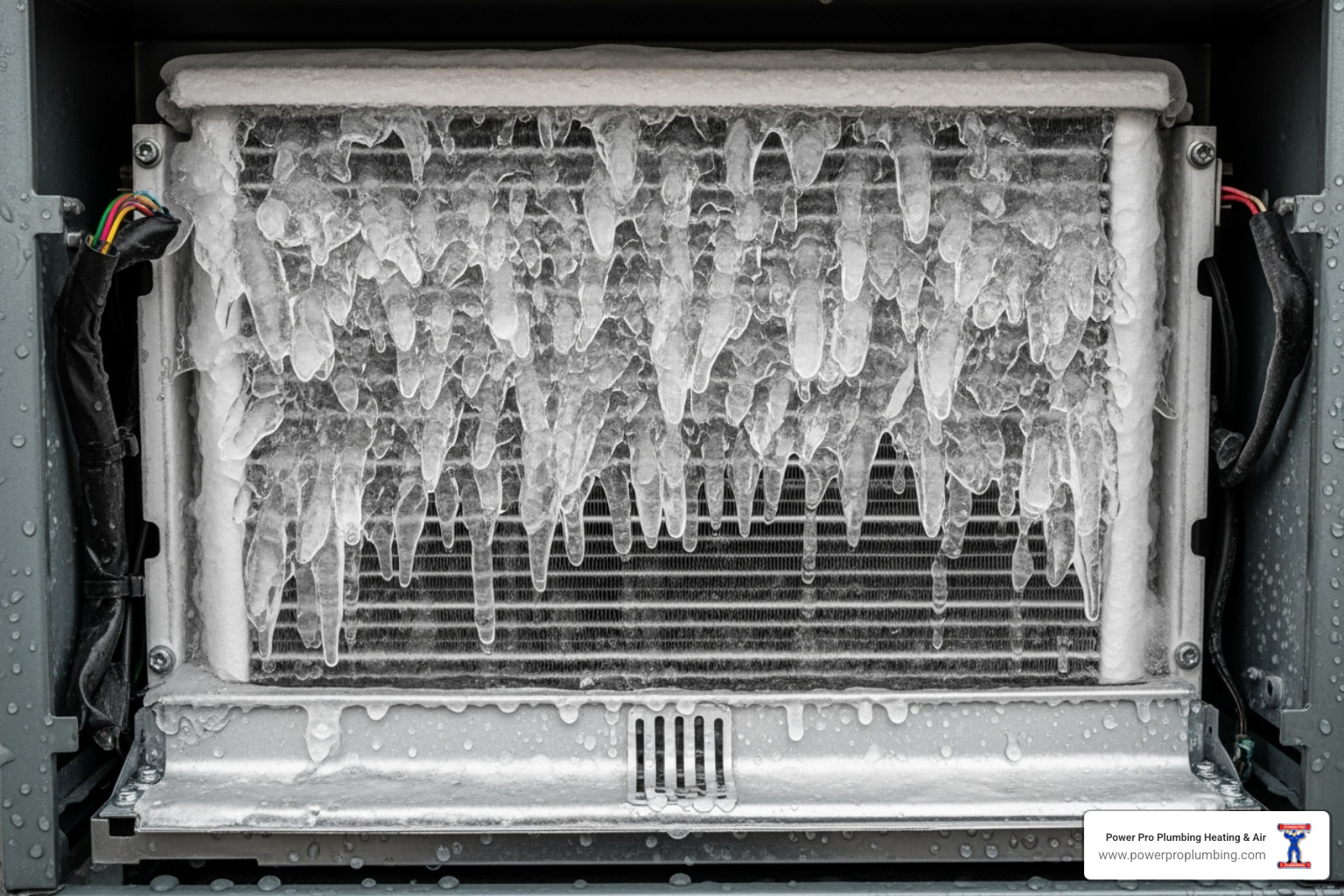
Here are the key signs that point to a frozen AC:
- Visible ice on evaporator coils or refrigerant lines
- Frost on copper suction lines
- Warm or no air coming from supply vents
- Water pooling around the indoor unit
- Constant running without reaching the thermostat setting
- Higher electricity bills
- Unusual sounds like hissing, bubbling, or dripping
Catching these symptoms early can save you from expensive compressor failure and water damage. If you see these warning signs, it's time to take action.
Why Your AC System is Freezing Up: The Main Culprits
When your AC system is freezing up, it means something has disrupted the heat transfer process. Your AC's indoor evaporator coil is designed to absorb heat from your air. If it can't absorb enough heat, its surface temperature drops below freezing, and moisture from the air turns to ice on the coil.
Airflow restriction is the number one cause of a frozen AC. Without enough warm air moving across the evaporator coil, it quickly becomes too cold and freezes.
Poor Airflow and Your AC System Freezing Up
Poor airflow is the most common reason your AC system is freezing up. Several issues can cause it:
- Dirty Air Filters: A clogged filter is the top offender. It blocks air from reaching the evaporator coil, causing it to freeze. Changing your filter can improve efficiency by 5-15%. Check it monthly and replace every 1-3 months. For guidance, see this guide on changing your AC's air filter.
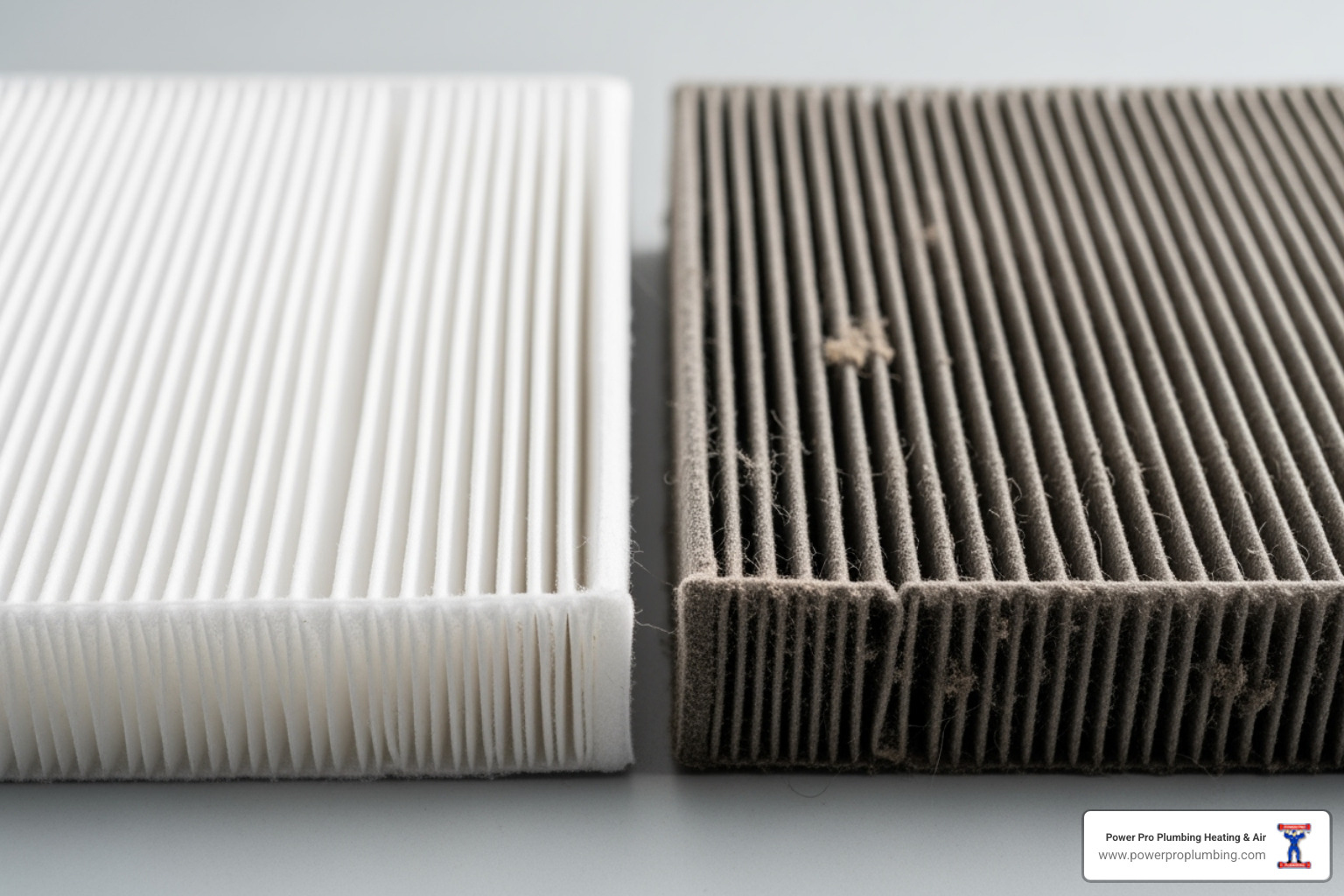
- Blocked Vents and Registers: Furniture, curtains, or rugs covering supply or return vents will choke your system's airflow.
- Damaged Ductwork: Leaks, crushed sections, or collapses in your ductwork hidden in walls or attics can severely restrict airflow to the unit.
- Faulty Blower Fan: The fan circulates air through your system. A failing motor, bad capacitor, or broken belt means less air moves across the coil, leading to a freeze-up.
Low Refrigerant and Pressure Problems
Low refrigerant is another primary cause. Your AC has a sealed refrigerant system; low levels mean there is a leak. When refrigerant is low, the pressure inside the evaporator coil drops. This pressure drop causes the refrigerant to become cold, freezing any moisture on the coil, a process related to the Joule-Thomson effect. Since it's a sealed system, simply adding refrigerant is a temporary fix. The leak must be repaired by a professional.
Dirty Coils and Mechanical Failures
Other issues can also lead to freezing:
- Dirty Evaporator Coils: A coil coated in dirt and grime is insulated, preventing it from absorbing heat effectively. This causes it to get too cold and freeze.
- Clogged Condensate Drain Line: This line removes moisture pulled from the air. If it clogs, water backs up into the drain pan and can freeze if the coil is already too cold.
- Stuck Contactors: This electrical switch can get stuck in the "on" position, forcing the compressor to run constantly. This non-stop operation can cause the system to freeze, especially in cooler weather.
What to Do Immediately When Your AC Freezes
If you find your AC system is freezing up, don't panic. Taking these immediate steps can prevent serious damage and may even solve the problem.
A Step-by-Step Guide to Thawing Your AC
Step 1: Turn Off the CoolingGo to your thermostat and switch the system from "Cool" to "Off." This stops the compressor from running and making the ice buildup worse. For added safety, you can also turn off the AC's circuit breaker.
Step 2: Turn On the FanNext, change the thermostat's fan setting from "Auto" to "On." This keeps the indoor blower running, circulating room-temperature air over the frozen coil to speed up the melting process.
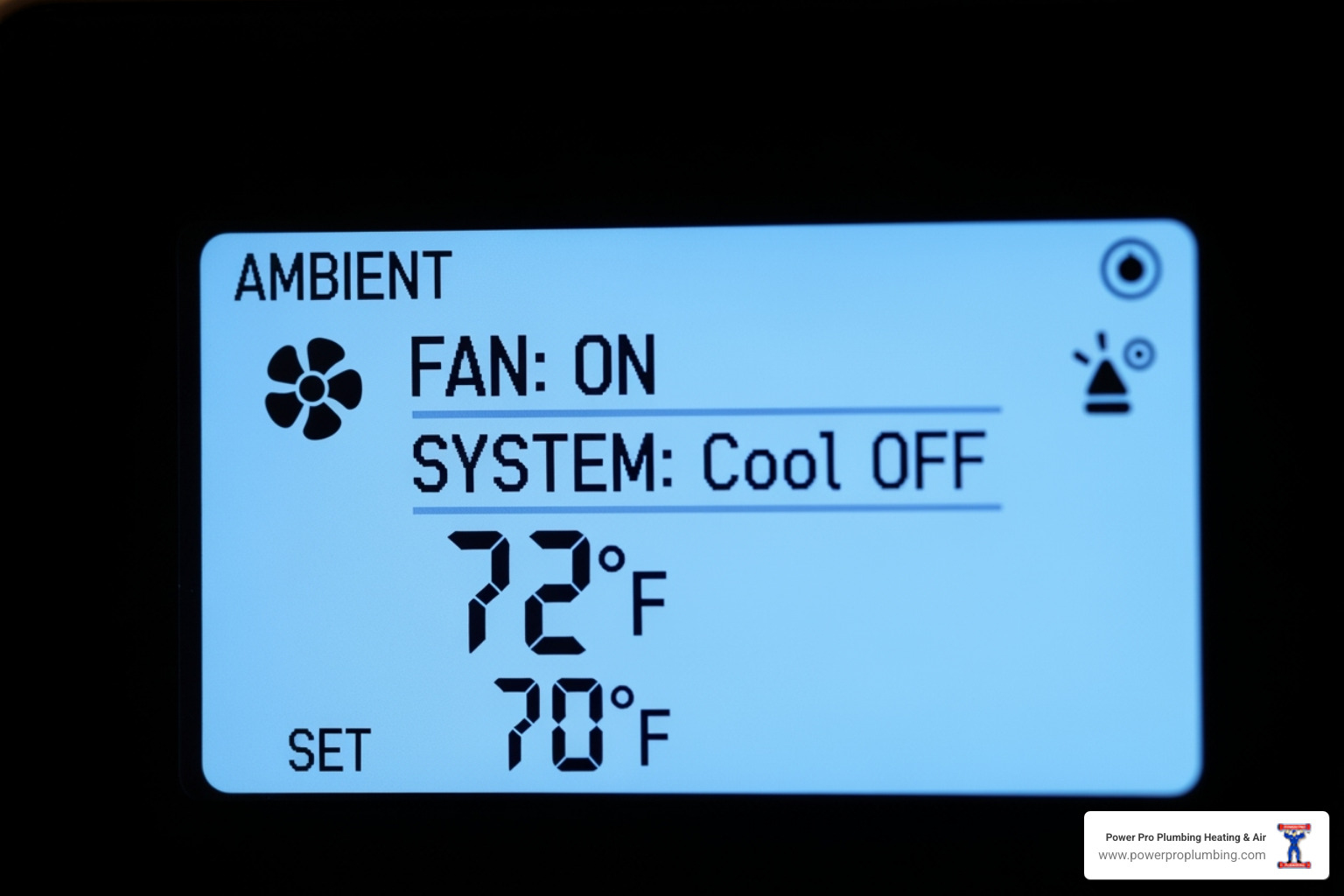
Step 3: Allow the Ice to Melt CompletelyBe patient. Thawing can take anywhere from an hour to a full day, depending on the amount of ice. Place towels around the indoor unit to catch dripping water.
Step 4: Look for the Simple CauseWhile the unit is thawing, check for common culprits. The most likely cause is a dirty air filter, so replace it if it's clogged. Also, ensure all air vents and registers are open and unblocked by furniture or curtains.
Step 5: Restart and MonitorOnce all the ice has melted, you can turn your system back to "Cool." Watch it for a few hours. If the AC system freezing up problem returns, it's a sign of a deeper issue that requires a professional.
The Dangers of Ignoring a Frozen AC
It's tempting to hope the problem goes away, but ignoring a frozen AC can lead to severe consequences:
- Compressor Damage: The compressor is the heart of your AC. A frozen coil can send liquid refrigerant back to the compressor, causing catastrophic failure. This is one of the most expensive HVAC repairs.
- Water Damage: Melting ice can overwhelm the drain pan, causing water to leak into your home, damaging ceilings, floors, and walls, and promoting mold growth.
- Increased Repair Costs: What starts as a simple airflow problem can strain other components like the blower motor, leading to more complex and costly repairs.
- Complete System Failure: Continued operation with a freezing issue can lead to the premature failure of your entire AC system.
Preventing Future Freeze-Ups with Regular Maintenance
Proactive care is the best way to prevent your AC system from freezing up. Regular maintenance catches small problems before they become expensive headaches, improves efficiency, and extends the life of your unit. According to the U.S. Department of Energy, simple maintenance can boost system efficiency by 5% to 15%. Learn more about the importance of AC maintenance.
DIY Maintenance Checklist
You can prevent most freezing problems with these simple DIY tasks:
- Change Air Filters Regularly: This is the most critical step. A clogged filter restricts airflow and causes freezing. Check your filter monthly and replace it every 1-3 months.
- Keep Vents and Registers Clear: Ensure that furniture, rugs, and curtains are not blocking any supply or return air vents in your home.
- Clean the Outdoor Condenser Unit: Periodically remove leaves, grass clippings, and debris from around your outdoor unit to help the entire system run more efficiently.
- Check the Condensate Line: Occasionally flush the drain line with a vinegar and water solution to prevent clogs that can cause water to back up.
The Role of Professional Tune-Ups
While DIY tasks are vital, an annual professional tune-up is essential for preventing an AC system from freezing up. A certified technician can perform services you can't, including:
- Coil Cleaning: Deep cleaning the indoor evaporator and outdoor condenser coils to ensure proper heat transfer.
- Refrigerant Level Check: Measuring refrigerant pressure to identify and repair leaks. Refrigerant should only be added after a leak is fixed.
- Electrical and Mechanical Inspection: Checking capacitors, contactors, and the blower motor to catch failing parts before they cause a breakdown.
- Ductwork and Drain Line Service: Inspecting for hidden ductwork blockages and professionally flushing the condensate drain line to ensure proper drainage.
Routine professional maintenance is the surest way to avoid waking up to a frozen AC unit.
Frequently Asked Questions about Frozen AC Units
Here are answers to common questions about an AC system freezing up.
What's the difference between a frozen evaporator coil and a frozen condenser unit?
When an AC system is freezing up, the ice is almost always on the evaporator coil, which is part of your indoor unit. It freezes due to internal problems like low airflow or low refrigerant. The condenser unit is the large box outside your home that releases heat. It rarely freezes during normal cooling. Ice on the copper pipe connecting the two units is a symptom that the indoor coil is frozen.
Can my thermostat settings cause my AC to freeze?
Yes. Running your AC when the outside temperature is too cool (below 60°F) can cause the system to freeze. Residential AC units are not designed to operate in low ambient temperatures. To prevent this, avoid running the AC on cool nights or use a programmable thermostat to manage settings automatically.
Are some AC systems more likely to freeze?
Yes, certain factors increase the risk of an AC system freezing up:
- Older Systems: Age and wear make components like the blower motor or coils less efficient and more prone to problems that cause freezing.
- R-22 Refrigerant Systems: These older systems use a phased-out refrigerant. Leaks can be costly to repair, so problems are sometimes ignored, leading to recurring freezing.
- Poorly Maintained Systems: Any AC, new or old, is more likely to freeze if it isn't regularly maintained. Skipped filter changes and tune-ups are a primary cause.
- Improperly Sized Systems: An AC that is too large or too small for your home will not run efficiently and can be more susceptible to freezing issues.
A properly sized and maintained system is far less likely to have freezing problems.
Get Professional Help for Your Frozen AC
While a dirty filter is a simple fix, sometimes an AC system freezing up signals a more serious problem. If you've thawed your unit and replaced the filter but the ice returns, it's time to call a professional.
Recurring freezing often points to issues like a refrigerant leak, a failing blower motor, or damaged ductwork that require expert diagnosis and repair. Attempting to fix these complex problems yourself can be dangerous, void your warranty, and lead to more expensive damage. Refrigerant handling and electrical work should always be left to certified technicians.
At Power Pro Plumbing Heating & Air, our expert technicians have the tools and knowledge to find out why your AC system is freezing up and fix it right. We serve the greater Los Angeles area, including Long Beach, Cerritos, and nearby communities. With over 28,573 online reviews and strong warranties as a Daikin Comfort Pro, we provide service you can trust.
Our Power Pro Club maintenance plans are also a great way to prevent freezing issues before they start. Don't let a frozen AC ruin your summer. If you're in the Long Beach & Cerritos area, schedule your AC repair with us today to get your cool air back.

